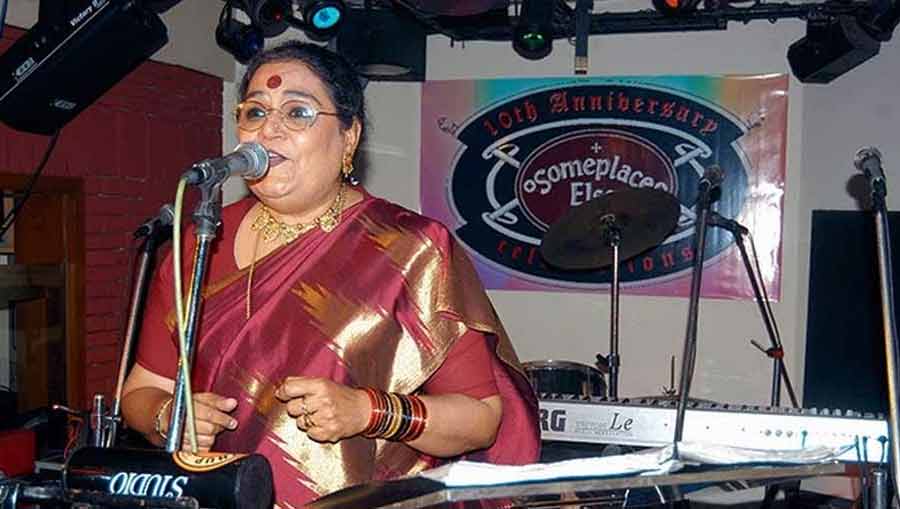Her performance in a West Bengal government programme had led to a widespread debate on sanskriti vs apasanskriti (culture vs decadent culture), forcing her to file a defamation suit against a minister.
Now, after over three decades, pop icon Usha Uthup finds that episode "wonderful" as the Calcutta High Court, the media and the then chief minister Jyoti Basu stood by her.
"Art and politics shouldn't mix at all... It is not a healthy thing," she said at a programme in Calcutta in which the English translation of her authorised biography was released.
In 1986, the Left Front government had organised a music and dance extravaganza to raise funds for flood relief and a galaxy of local and Bollywood stars were invited to perform. Uthup, who has been singing pop songs in Bengali, Hindi, English and other languages in the city since 1969, was one of them.
The Yuva Bharati Krirangan, popularly known as Sat Lake Stadium, was filled to capacity and the crowd cheered to the stars, whistled to the tunes of songs and tapped feet to dance beats. The chief organiser of the programme, christened 'Hope-86', was the then sports and youth affairs minister Subhas Chakraborty, a popular CPI(M) leader who died in 2009.
His Cabinet colleague, RSP leader late Jatin Chakroborty, however, was a bit squeamish and made some disparaging remarks about her songs, saying those will pollute the state's traditional culture.
"If I look back to those days, I recall how the entire media stood by me, the then chief minister Jyoti Basu stood by me, how people of Bengal stood by me. I thank the Calcutta High Court for upholding the right of an artist. It was a lovely picture, a wonderful picture in retrospect," Uthup told a gathering at a book store.
Chakraborty did not attend the soiree but Basu sat through it. To a question, Uthup, who was born in a Tamil family in Mumbai, said unlike many other Bengalis born to Bengali parents, she became a Bengali by her own will. She met her future husband while singing at a restaurant 'Trincas' in the city.
"My marriage had taken place to a Bengali in Calcutta. And unlike you, I became a Bengali by my own will. In fact, Kolkata allows you to be a caring and sharing person, a phuchka person, a Bengali by heart," she said. Phuchka in Calcutta is what panipuri in Delhi and golgappa in Mumbai.
"Calcutta gives you that much space and freedom to embrace everything you are passionate about the city and Bengal. You turn out to be a Bengali here," she said during the question-answer session at the heritage Oxford Book Store here last week.
In this context, Uthup said she loves speaking and singing in several languages such as Hindi, Tamil, Bengali, Marathi, Telugu, Assamese and Bhojpuri. "When I used to sing in Trincas restaurant five decades back... after belting out western tracks, I would shift to a Rabindra Sangeet (Tagore song) and the boisterous crowd would become silent," said the veteran singer.
Uthup said as a fan of American singer Frank Sinatra, she had sent him a letter voicing her admiration about the legend where she had written: "This is Usha. I also sing. Hoping to meet you one day."
"But there was no Instagram in those days and Sinatra never replied," she said. On singer-composer Bappi Lahiri who died last month, Uthup said he had given her numbers such as Ramba Ho and Hari Om Hari which were instant hits.
"But I think in his life people did not take Bappida seriously. Why was he only labelled as Disco King? He did so many melody songs. He made wonderful melody songs such as Chalte Chalte," she said.
Uthup was interacting with an audience after the launch of The Queen of Indian Pop: The Authorized Biography of Usha Uthup. Originally written in Hindi by Vikas Kumar Jha and titled "Ullas Ki Naav", the book is translated by the author's daughter Srishti Jha.











